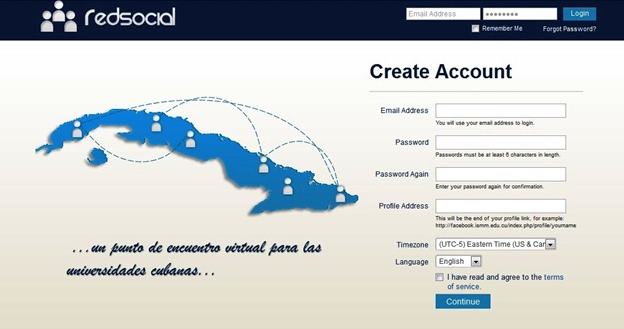By Alexei Summers (The Cascade) – Email
Print Edition: January 25, 2012
Things have changed in Cuba. Gone are the days of Cold War standoffs and naval blockades between Kennedy and Khrushchev.
U.S. President John F. Kennedy once referred to Cuba as “that imprisoned island.” That was during the Cuban Missile Crisis, and now the small Caribbean island has armed itself not with missiles but social networking. Cuba now has a social networking website that looks almost identical to the popular social networking site Facebook. Aptly named “Red Social,” the site itself, from screenshots posted on the internet, appears to mimic Facebook’s iconic style. In fact, little seems to be changed.
Cuba is a communist country run by revolutionary Fidel Castro – a charismatic, bearded leader who is well-known for having an iron-like vice grip on all information coming in and coming out of the nation.
In the ‘60s, Cuba made headlines by being a staging ground for USSR missile sites. There was a fierce naval blockade by the United States, and nuclear weapons were nearly used several times. Since then, Cuba has been affected by a trade embargo imposed by the United States when, after a long revolution, the country off Florida’s coast became a communist state. To this day, American law dictates that its citizens are not allowed to visit Cuba, nor do business in or with Cuba. It’s yet to be seen if this new move towards social networking will have any effect on US-Cuban Relations. The site itself is not accessible outside of the island, as it runs on an intranet system.
The trade embargo itself has been highly criticized, as have the restrictions on access of information within Cuba. It’s been questioned whether the US should continue with the embargo or not. Many nations condemn the embargo, saying it prolongs the standstill that has contributed to Cuba’s social situation.
Moisés Naím, a journalist from Newsweek said that, “[t]the embargo is the perfect example used by anti-Americans everywhere to expose the hypocrisy of a superpower that punishes a small island while cozying to dictators elsewhere.”
Very little is known about the Red Social website. The site was launched in December and appears to be intended for the university student demographic. The homepage for the Red Social network is reported to read, “a virtual meeting point for Cuban universities.” The real question here is this: is this new social networking site a move towards Cuba becoming a modern country, and is this in fact a step towards greater access to information by the Cuban government? Or, is this another cheap post-Cold War grab for propaganda? And – more importantly – one must ask if the US Trade Embargo is really helping the Cuban people or imprisoning them, forcing them to remain in a state of prolonged political and technological standstill.


